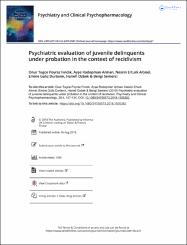| dc.contributor.author | Poyraz Fındık, Onur Tuğçe | |
| dc.contributor.author | Rodopman-Arman, Ayşe | |
| dc.contributor.author | Ertürk Altınel, Nesrin | |
| dc.contributor.author | Durlanık, Emine Güliz | |
| dc.contributor.author | Özbek, Hanefi | |
| dc.contributor.author | Semerci, Bengi | |
| dc.date.accessioned | 10.07.201910:49:13 | |
| dc.date.accessioned | 2019-07-10T19:37:19Z | |
| dc.date.available | 10.07.201910:49:14 | |
| dc.date.available | 2019-07-10T19:37:19Z | |
| dc.date.issued | 2019 | en_US |
| dc.identifier.citation | Poyraz Fındık, O., Rodopman Arman, A., Ertürk Altınel, N., Durlanık, E., Özbek, H. ve Semerci, B. (2019). Psychiatric evaluation of juvenile delinquents under probation in the context of recidivism. Journal of Psychiatry and Clinical Psychopharmacology, 29(4), 427-434. https://dx.doi.org/10.1080/24750573.2018.1505282 | en_US |
| dc.identifier.issn | 2475-0573 | |
| dc.identifier.uri | https://hdl.handle.net/20.500.12511/1379 | |
| dc.identifier.uri | https://dx.doi.org/10.1080/24750573.2018.1505282 | |
| dc.description.abstract | OBJECTIVE: High rates of psychiatric disorders and comorbidities have been reported in the juvenile justice system, and both phenomena are thought to contribute to repetitive offending. Although extensive research on the prevalence of psychiatric disorders in juvenile offenders has been conducted in European countries and the USA, epidemiological research concerning this issue is limited in Turkish population. The aim of the present study is to examine psychiatric diagnoses, comorbidity patterns, psychometric properties, and the factors related to recidivism defined as reconvictions, in juveniles under probation in Turkey. METHODS: We conducted face-to-face interviews with volunteers. This study sample consisted of 55 individuals (Female/Male = 4/51) who were in the Istanbul Anatolian Probation Department. The participants’ age ranged from 14 to 18 years (mean age = 17.22 ± 0.62). Diagnoses were established based on the Kiddie Schedule for Affective Disorders and Schizophrenia for School Age Children Present and Lifetime Version. A detailed sociodemographic form, Wechsler Intelligence Scale, Child Depression Inventory, and Beck Anxiety Inventory were used for assessment. The subjects were divided into two groups based on the number of conviction: Group 1 consisted of 65% of the sample (n = 36) with one conviction and Group 2 consisted of 35% of the sample (n = 19) with more than one conviction. We examined the psychometric properties that might predict recidivism through the logistic regression analysis. RESULTS: We ascertained that 67.3% of the juveniles had at least one psychiatric disorder, and 45.5% had two or more comorbid psychiatric disorders. The most common diagnosis was attention deficit hyperactivity disorder (ADHD) (43.6%), and followed by depressive mood disorders (34.5%). Juveniles in Group 2 were less educated, had low levels of verbal, performance and total intelligence quotient (IQ) score, had more numbers of psychiatric diagnoses, particularly depressive mood disorders and history of substance use disorders (p <.05). Having a higher number of psychiatric diagnoses and having comorbidity of both externalizing (i.e. ADHD, conduct disorder) and internalizing disorders (i.e. depressive mood disorders, anxiety disorders) were significantly higher in Group 2 (p <.05). Total duration of education (OR = 0.470, 95% CI = 0.257–0.861, p <.05) and having at least one psychiatric disorder (OR = 10.64, 95% CI = 1.642–68.954, p <.05) were found to predict multiple convictions. CONCLUSION: Juveniles in the justice system are faced with multiple psychiatric disorders, along with social/environmental adversities. There is a need of a holistic approach addressing multiple areas to prevent repetitive offending behaviour. Accordingly, in addition to legal sanctions, evaluation and interventions regarding mental health will contribute to improve for both psychosocial well-being of delinquent juveniles and prevention strategies for recidivism. | en_US |
| dc.language.iso | eng | en_US |
| dc.publisher | Taylor and Francis Ltd. | en_US |
| dc.rights | info:eu-repo/semantics/openAccess | en_US |
| dc.rights | Attribution 4.0 International | * |
| dc.rights.uri | https://creativecommons.org/licenses/by/4.0/ | * |
| dc.subject | Comorbidity | en_US |
| dc.subject | juvenile Delinquency | en_US |
| dc.subject | Repetitive Offending | en_US |
| dc.subject | Risk Factors | en_US |
| dc.title | Psychiatric evaluation of juvenile delinquents under probation in the context of recidivism | en_US |
| dc.type | article | en_US |
| dc.relation.ispartof | Psychiatry and Clinical Psychopharmacology | en_US |
| dc.department | İstanbul Medipol Üniversitesi, Tıp Fakültesi, Dahili Tıp Bilimleri Bölümü, Tıbbi Farmakoloji Ana Bilim Dalı | en_US |
| dc.authorid | 0000-0002-8084-7855 | en_US |
| dc.identifier.volume | 29 | en_US |
| dc.identifier.issue | 4 | en_US |
| dc.relation.publicationcategory | Makale - Uluslararası Hakemli Dergi - Kurum Öğretim Elemanı | en_US |
| dc.identifier.doi | 10.1080/24750573.2018.1505282 | en_US |
| dc.identifier.wosquality | Q4 | en_US |
| dc.identifier.scopusquality | Q3 | en_US |



















